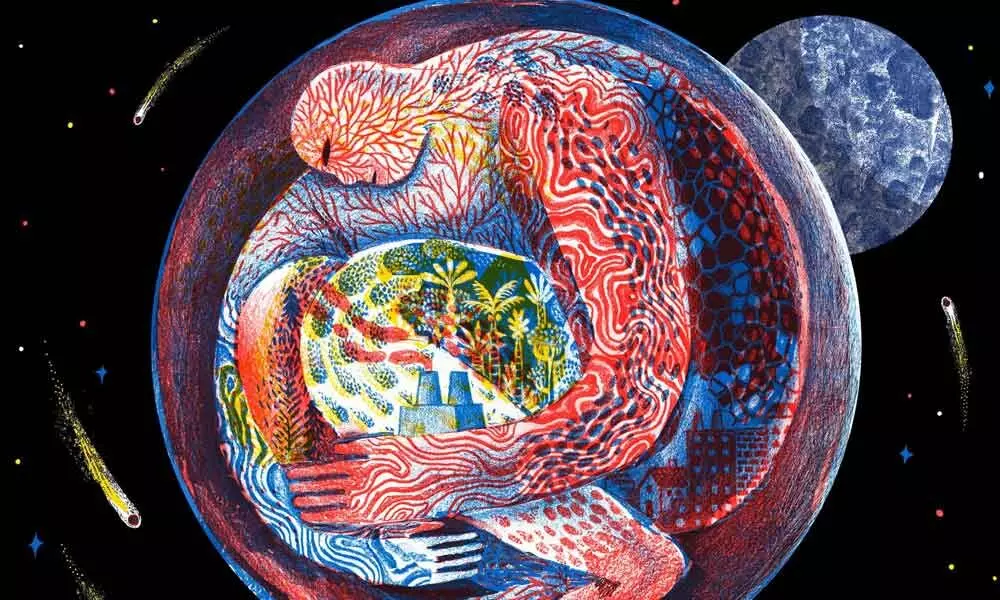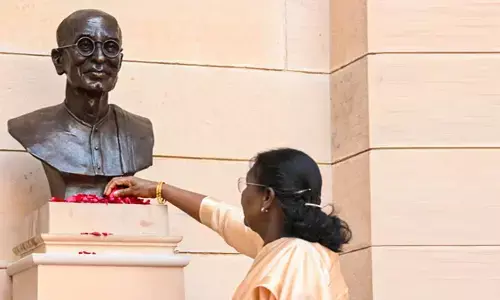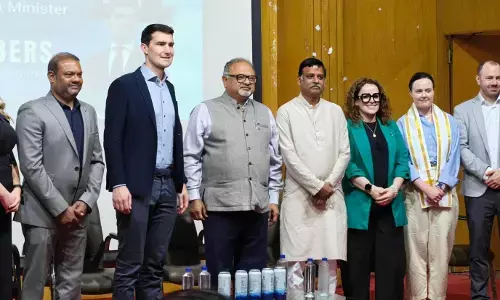'I feel, therefore, I am alive'

Representational Image
This year’s Nobel Prize, for medicine, was awarded to the duo of David Julius and Ardem Patapoutian, for their work in studying the role of heat in the function of sensory organs of human beings.
This year's Nobel Prize, for medicine, was awarded to the duo of David Julius and Ardem Patapoutian, for their work in studying the role of heat in the function of sensory organs of human beings. Reading the news of that award set off a train of thoughts in my mind about the human body and its wonders.
"No minor vices", is the somewhat tongue-in-cheek response provided by some persons, to the question whether they have any addictions. This columnist, also, had succumbed to the teenage temptation (at least in those times, when one knew little about the attendant hazards), of trying his hand at having a smoke. It struck, and lasted all of 55 years, until it left, a few years ago, all of a sudden.
And then began the process, of re-discovery, of the pleasures the sensory organs can provide. Thanks to a lethal combination of carbon dioxide, tobacco and heat, the extremities of the body had become somewhat numb, the tongue had lost most of its ability to discern tastes, hearing had become partially impaired, eyesight had lost some of its sharpness and the voice had become a little gruff. The teeth were also coated with stains of nicotine, and appetite no longer had the earlier edge.
So much so, that one had to visit, at one time or other, the whole range of specialists in the medical profession, such as the ophthalmologist, the ENT physician, the neurologist, the gastroenterologist, and the dentist, not to mention the cardiologist.
Such is the remarkable resilience, however, of the human body that, gradually and sense by precious sense, each perception has recovered from the effect of abuse until, now, some four years later, its efficacy has, more or less, returned to the original level. Subject to considerations of age, of course. And one has begun to appreciate the role these organs have to play in one's ability to perceive nature and enjoy its bountiful offerings Realisation also dawned, of how much one had, earlier, taken for granted their invaluable contribution to one's sense of well-being.
The mystery of our ability to sense the environment around us has fascinated humanity for centuries. Hindu philosophy identifies five means of perception by the sensory organs namely 'panchendriya'. These are the nose, the eyes, the tongue the skin and the ears. The five senses associated with these organs are respectively, smell, form, taste, touch and sound.
The mechanisms underlying the functioning of the sensory organs-how light is detected by the eyes, how sound waves are picked up by our ears, and how the nose and the mouth smell and taste have been the objectives of curiosity for an even longer time. It is also true that one's ability to see, hear, smell and touch is critical for survival, as also the primary means of interaction with the ambient surroundings.
The animal in the jungle, for example, survives mainly on its ability to interpret the meanings of sounds, and smells, in terms of opportunities as well as threats. It is interesting, in this context, to note that the ear lobe of the human beings was, long ago, capable of twitching, in order to sharpen the faculty of hearing (much as dogs and cats do even now), an instinct that has now become defunct, following disuse on account of the absence of need in the safe surroundings that obtain now.
Therefore, in a way, the work of the two Nobel laureates helped answer one of the most profound questions about the human condition or how one senses one's environment! The duo unravelled the mystery what converts physical sensations into electrical messages which the nervous system then conveys to the brain, and how that happens. Their work also shed valuable light on technologies that can lead to new ways of treating, and reducing, chronic and acute pain associated with a range of diseases, including trauma.
Little wonder, then, that it has also led to intensive research into the development of treatments for a wide range of diseases. Strangely enough, it has also led to the discovery of array of other temperature-sensors. Hardly surprising than, that a member of the Nobel Prize committee actually described the discovery as "very important and profound".
Surprisingly enough, the breakthrough, for David Julius, actually came from investigations being carried out, by him into the burning pain human beings feel from eating hot chilli peppers! And Ardem Patapountain, who was poking cells in a dish at the Scripps Research Institute, discovered a different type of receptor that is activated in response to mechanical force or touch, and send signals to the brain accordingly, such as the sensation you feel, of sands under your feet, while walking along a beach.
Each of the 'panchendriya' has been designed to function within a certain range, a frequency band, if you like. For example, it is common knowledge that the naked eye can only identify colours in the bandwidth of light from violet to red (the rainbow band of rays of light). Rays of light with frequencies higher than that of violet, or 'ultraviolet' rays, as well as those with frequencies less than that of red, or 'infrared' rays, are invisible. Similarly, the ear can pick up sounds within a certain range above which, and below which, are what are known as ultrasonics and infrasonic sounds, which lie outside the audible range of the ear. Animals such as dogs and marine creatures, such as whales, can, however, pick up such signals.
Employing the sensory organs can, on occasion, lead to extremely unpleasant experiences too. For instance, touching objects which are extremely cold can 'burn' the skin just as touching a red hot object will. Extremely bright light, which emanates from a sheet of snow can, similarly, be harmful, and cause what is called 'snow blindness'. And all of us enjoy firecrackers giving out loud sounds, up to a point, beyond which they can cause pain to the ear drum, and even result in permanent damage.
General N.C. Vij, a former Chief of Army Staff is a person I admire greatly. He was the Vice Chairman of the National Disaster Management Authority when I was a Member. He still wears a hearing aid, to compensate for the loss of hearing, which occurred when a grenade burst close to him during operations at the border. It is a separate matter that it has now become a decoration for him, and a reminder of his bravery and valour, rather than a handicap!
And who is not familiar, with the 'bitter medicine' one is made to swallow, as the unpleasant taste is the route to recovery from sickness. There are, then, things like eggs, which are a treat to the palate, when properly prepared, but can emanate a nasty stench when they go rotten! The sensory organs, clearly, or only instruments, that can lead to pleasure, or pain, depending on the manner in which one deploys them.
There is, naturally, a certain amount of volition involved in putting your sense organs to work. You have, for instance, to 'look' in order to 'see', to 'listen' in order to 'hear' and 'speak' in order to 'talk'. Likewise, you have to 'touch' in order to 'feel'.
"I think, therefore I am", said René Descartes. That may well be appropriate for the regime of intellectual activity. However, for the realm of sensory experiences, the expression "I feel, therefore I am alive", is perhaps more apt. Be that as it may, the point to rejoice about is that the discovery of the Nobel laureate duo augurs well for a future in which humanity can hope for effective remedies for chronic or acute pain.
(The writer is former
Chief Secretary, Government
of Andhra Pradesh)
(The opinions expressed in this column are that of the writer.
The facts and opinions expressed here do not reflect the views
of The Hans India)








